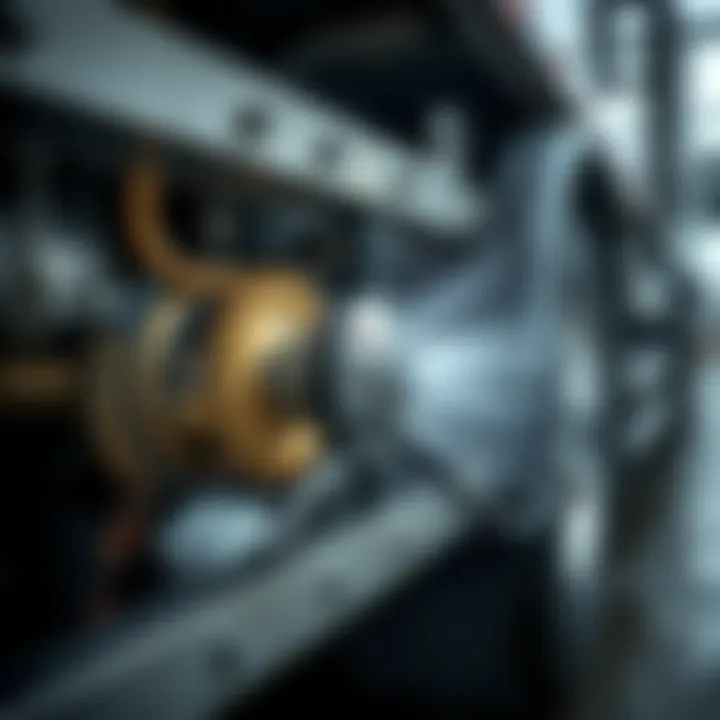In-Depth Insights on Under Truck Pressure Washers


Intro
Under truck pressure washers represent a crucial but often overlooked segment of automotive maintenance technology. These devices primarily serve to cleanse the undercarriage of vehicles, where dirt, grime, and road salt can accumulate over time. As vehicles traverse through different environments, they pick up various contaminants that, if left unaddressed, can lead to corrosion and a shortened lifespan of key components. Understanding the specifics of under truck pressure washers not only helps car enthusiasts maintain their vehicles more effectively but also informs potential buyers about the best products on the market that fit their needs.
In this detailed exploration, we delve into the significant aspects of under truck pressure washers. We’ll cover various types of models available, the operational mechanisms that drive their effectiveness, and critical considerations for selecting the right unit. Moreover, practical tips for implementing and maintaining these machines will be shared along with an examination of emerging technologies that broaden the potential benefits of under truck cleaning processes. By the end, readers will have a comprehensive awareness of this specialized yet invaluable area of automotive care.
Prolusion to Under Truck Pressure Washers
In the realm of automotive care, cleanliness is not just about aesthetics; it’s fundamentally linked to performance and maintenance. This is where under truck pressure washers step in, playing a pivotal role in maintaining vehicles and enhancing longevity. Keeping the underside of trucks clean from road grime, oil, and other buildup can prevent rust and corrosion, which might otherwise lead to costly repairs down the line. Moreover, regular cleaning can help in identifying potential issues before they escalate, essentially acting as a preventive measure.
Using an effective under truck pressure washer goes beyond simple dirt eradication; it’s about performance optimization. A clean truck not only looks sharp, but its components function more efficiently when free from contaminants. Removing dirt or mud helps speed up maintenance checks and allows mechanics to examine parts that might be hidden under layers of filth.
The Role of Cleanliness in Automotive Maintenance
When it comes to automotive upkeep, cleanliness is akin to preventative health care. Just as neglecting personal hygiene can lead to various health issues, failing to maintain a clean vehicle can manifest into more severe problems.
An under truck pressure washer helps by:
- Preventing Corrosion: Oil and grime buildup can lead to rusting over time. By maintaining a clean undercarriage, you can extend the lifespan of metal parts.
- Enhancing Safety: Clean brakes, suspensions, and other components ensure that vehicles operate safely. Any dirt that masks these critical parts could potentially hide issues that can cause accidents.
- Improving Performance: A clean vehicle operates at peak efficiency. Dust and debris can decrease fuel efficiency and engine performance, while proper cleaning enhances overall functionality.
These considerations emphasize that cleanliness is not an optional luxury, but a necessity for anyone serious about maintaining their vehicles.
Overview of Pressure Wash Technology
Pressure washing itself has evolved significantly. This technology employs high-pressure water to dislodge dirt, grease, and grime, making it a powerful ally in automotive cleaning. Understanding the core mechanism can sharpen your choice in equipment.
Key elements of pressure wash technology include:
- Pressure Levels: Measured in PSI (pounds per square inch), this metric defines the power of the water stream. Higher pressures are needed for tougher grime.
- Flow Rates: Measured in GPM (gallons per minute), flow rates determine how fast water is delivered to a surface. A balance between pressure and flow ensures effective cleaning without damaging sensitive components.
- Temperature: Water temperature can significantly influence cleaning effectiveness. Hot water can break down grease better than cold water, making hot water pressure washers particularly useful for heavy-duty applications.
Investing in an under truck pressure washer equipped with advanced pressure washing technology can yield remarkable benefits, not just in efficiency but also in ensuring that your vehicle remains in prime condition. Consideration of these aspects will guide you in making an informed choice in your pressure washer acquisition.
Types of Under Truck Pressure Washers
Understanding the various types of under truck pressure washers is crucial for those who seek efficiency and effectiveness in vehicle cleaning. Each type comes with its own set of features and benefits tailored to different cleaning needs, making it essential to choose the right model based on specific requirements and circumstances. Let’s take a closer look at the primary categories available in the market today.
Cold Water Pressure Washers
Cold water pressure washers are the most common and generally the most affordable option, making them the go-to choice for many users. These machines use standard water, typically at ambient temperature, to deliver high-pressure jets for removing dirt, mud, and grime from under vehicles.
Advantages:
- Cost-effective: Cold water options usually come at a lower price point compared to their hot water counterparts.
- Simplicity: They are often easier to maintain and operate, requiring less complex machinery compared to hot water units.
- Adequate for Light to Moderate Cleaning: For regular dirt and debris, these washers get the job done effectively.
However, they may struggle with tougher stains or grease buildup. In situations where oil or heavy contaminants are involved, the effectiveness of cold water pressure washers may decline, necessitating a switch to hotter cleaning solutions.
Hot Water Pressure Washers
Hot water pressure washers bring a bit more muscle to the table and are particularly effective for tasks that involve oil, fat, and heavy soiling. These units heat water to a specified temperature, allowing for a more aggressive cleaning performance against stubborn stains.
Benefits:
- Greater Cleaning Power: The combination of heat and pressure breaks down oily and greasy residue more effectively, reducing the need for additional chemicals.
- Versatile Applications: They can also assist in thawing ice or snow, making them more suitable for use in colder climates.
- Time Efficiency: Users often find they can complete cleaning tasks faster due to the elevated temperature of the water.
These machines, however, do tend to come with higher upfront costs and may require more rigorous maintenance compared to cold water models.
Electric vs. Gas-Powered Models
When it comes to pressure washer power sources, two main types dominate the market: electric and gas-powered models. Each has its distinct advantages, and your choice will heavily depend on your specific cleaning needs.
Electric Models:
- Quiet Operation: They’re generally quieter, making them better suited for residential areas or places where noise restrictions are in place.
- Maintenance Ease: Typically, electric models require less maintenance. They are often lighter and easier to handle.
- Limited Reach: However, their cleaning range could be limited by the availability of power outlets nearby.
Gas-Powered Models:


- More Power: Gas washers provide a higher PSI (pounds per square inch) and GPM (gallons per minute), making them ideal for heavier cleaning jobs.
- Portability: They can be used virtually anywhere without dependence on an electrical source, important for large fleets or commercial applications.
- Higher Maintenance Needs: They do come with the caveat of needing more upkeep and are often noisier, which could be a concern in some environments.
Choosing the right type of under truck pressure washer requires weighing these factors against the specific context in which it will be used. Understanding their unique strengths and limitations helps ensure you invest in the most suitable tool for your cleaning tasks.
Key Features to Consider
When it comes to selecting the right under truck pressure washer, certain features stand out as crucial in making a well-informed decision. Understanding these key attributes can significantly enhance the performance and satisfaction of your cleaning tasks. Here, we will explore three essential aspects: pressure levels and flow rates, mobility and portability, and durability and build quality. Each of these elements plays a vital role in how effective and efficient an under truck pressure washer can be.
Pressure Levels and Flow Rates
The intensity of suction and the volume of water discharged are integral to the success of any pressure washing endeavor. High pressure levels are paramount when it comes to breaking down grime that has firmly attached itself to surfaces beneath vehicles.
Generally, pressure washers operate anywhere from 1,000 to 4,000 PSI (pounds per square inch). For under truck cleaning, a model that can generate at least 2,000 PSI is often recommended. Anything below that might not cut through the caked-on dirt and grease that tends to accumulate in this tough-to-reach area.
Equally important is the flow rate, measured in gallons per minute (GPM). While you want pressure for effective cleaning, a higher flow rate helps flush away debris promptly. A balanced combo of 2,500 PSI and 3 GPM can typically yield good results for under truck applications. Remember: it’s not just about pressure; it’s about how quickly you can move that water!
Mobility and Portability
Consider the environments and scenarios in which you'll be using your pressure washer. Vehicles come in all shapes and sizes and can be parked in various places, which is why mobility counts. In situations where you might need to maneuver in tight spots, a lightweight unit on wheels or one that is easy to carry can save a lot of grief.
There are models equipped with rubberized wheels that withstand rough terrain, making them a solid choice for those who work in outdoor settings or commercial garages. If you’re frequently on the move, look out for pressure washers that come equipped with sturdy handles and design features prioritizing ease of transport.
Durability and Build Quality
Investing in an under truck pressure washer is not a small decision; you want a unit that can withstand wear and tear. Put simply, durability should never be an afterthought. The materials used in construction directly affect longevity and efficiency. Models made from stainless steel or heavy-duty plastic offer a blend of strength and corrosion resistance, which is vital when dealing with dirty and wet environments.
Additionally, consider easily replaceable parts; after all, it’s always smart to plan ahead for maintenance and repairs. A robust, well-built pressure washer will serve you for years, handling the rigors of demanding cleaning tasks without flinching.
The right under truck pressure washer is not just a tool; it’s an investment in maintenance that will keep your vehicles looking their best.
In summary, a careful assessment of pressure levels and flow rates, ease of mobility, and sturdiness can lead you toward a machine that perfectly meets your cleaning needs. Understanding these key features will empower you in selecting the ideal under truck pressure washer that not only performs but also delivers value over time.
Applications of Under Truck Pressure Washers
The relevance of under truck pressure washers stretches far beyond mere aesthetics. They play a critical role in upholding the integrity of vehicle maintenance and safety across various domains. From ensuring commercial fleets remain compliant with cleanliness standards to maintaining the appearances enjoyed by car enthusiasts, these machines are indispensable. In this section, we delve into the specific applications that underscore their importance in the automotive world.
Commercial Vehicle Cleaning
For businesses that rely heavily on commercial vehicles—be it delivery trucks, construction equipment, or public transport—the cleanliness of these machines isn’t just about looks; it's about performance. Regularly cleaning the undercarriage helps in several ways:
- Prevention of Corrosion: Road grime, salt, and chemical residues accumulate underneath vehicles and can lead to rust over time. By utilizing an under truck pressure washer, businesses can prevent deterioration and extend the lifespan of their vehicles.
- Operational Efficiency: Dirt and grime can negatively impact machinery and hydraulic components. A clean undercarriage ensures that all mechanical parts function effectively, thereby avoiding operational hiccups.
- Compliance with Regulations: Many regions mandate a certain level of cleanliness for commercial vehicles, particularly in industries like food transportation or public services. Failure to comply can result in fines and damage to a company's reputation.
Utilizing a pressure washer not only averts such issues but also creates a professional image that resonates with customers and partners alike.
Fleet Maintenance Programs
Implementing an effective fleet maintenance program involves numerous components, but one often neglected area is cleanliness. Regular cleaning through under truck pressure washers can significantly enhance the efficacy of fleet maintenance efforts:
- Scheduled Cleanings: Incorporating under truck washing into routine maintenance schedules enhances the overall upkeep of a fleet. It can be seen as a part of preventive maintenance, where a small investment in time and cleaning can fend off major repairs later on.
- Increased Resale Value: Just like people, vehicles appreciate care and attention. A well-maintained fleet typically fetches a higher resale value, and part of that maintenance includes keeping them visible and clean.
- Health and Safety: In heavy-duty applications like waste management or construction, the undercarriage of vehicles can harbor hazardous materials. Regular pressure washing ensures that any hazardous residues are cleared, promoting a safer working environment for technicians and drivers alike.
Personal Use for Enthusiasts
Car enthusiasts relish the opportunity to keep their vehicles in pristine condition, but undercarriage maintenance is often overlooked. An under truck pressure washer offers several advantages for personal use:
- Thorough Cleaning: For those who invest time and money into their vehicles, a clean undercarriage enhances the overall look and maintenance of the car, ensuring that dirt and debris do not become everlasting stains.
- Prevents Long-Term Damage: Just as with commercial vehicles, regular cleaning can prevent rust and other damage, especially for those who may drive their cars in winter conditions where roads are salted.
- Customization and Modifications: Car enthusiasts often tinker with their vehicles, making modifications that could expose them to dirt accumulation. A pressure washer allows these individuals to maintain cleanliness without the risk of damaging components.
Through these applications, it is clear that under truck pressure washers are not just tools but are integral to a broader strategy of vehicle care.
Key takeaway: Whether for commercial fleets or personal pride, maintaining cleanliness beneath vehicles is crucial to performance, longevity, and safety.
Overall, the diverse range of applications of under truck pressure washers demonstrates their vital role in the automotive sector, ensuring vehicles are not just clean but also well-maintained and safe on the roads.
Benefits of Using an Under Truck Pressure Washer
In today's automotive industry, keeping vehicles in top condition goes beyond simple waxing and buffing. An under truck pressure washer serves as an indispensable tool for maintenance. This section explores several key advantages of using these washers that can transform routine cleaning into an effective process. Understanding these benefits can arm car enthusiasts and potential buyers with the knowledge they need to make informed choices regarding vehicle care.


Enhanced Cleaning Efficiency
When we talk about cleaning efficiency, an under truck pressure washer is in a league of its own. The powerful jets of water effectively dislodge dirt, grease, and grime from hard-to-reach areas. This is especially crucial for trucks and heavily-used vehicles where road sludge can build up quickly. The high-pressure delivery means you’re not just smearing dirt around; you’re blasting it away completely, which saves you from having to scrub endlessly.
Many models provide adjustable pressure settings. This means you can tackle different surfaces without damaging them, be it metal frames or rubber components.
"A pressure washer can be your best friend, especially when it comes to getting that stubborn dirt that regular cleaning can’t touch!"
Furthermore, the efficiency translates into saving water. Individual cleaning processes often consume a considerable amount of water. But pressure washers usually use less water than traditional hoses while providing better results. This helps conserve a valuable resource without sacrificing cleanliness.
Time and Labor Savings
Using an under truck pressure washer can significantly reduce the time spent cleaning. Imagine how long it would take to clean the underside of a vehicle using a manual method—likely hours of bending, scrubbing, and rinsing. In contrast, a pressure washer can do the job in a fraction of the time.
Also, labor can quickly add up if you're hiring a service. With an efficient pressure washer, you can handle these cleaning jobs yourself, freeing up cash for other maintenance tasks. Many users, even those who aren’t particularly handy, find that the ease of operation and quick results motivate them to clean more often, leading to better overall vehicle maintenance.
- Effortless operation
- Quick cleaning process
- Fewer labor hours needed
This empowerment not only streamlines vehicle care but also encourages regular cleaning routines, ultimately extending the lifespan of the vehicle.
Improved Safety and Visibility
There’s no denying the importance of safety, especially when it comes to heavy machinery and vehicles. A clean undercarriage improves safety by enabling better visibility of components that require regular inspection. A pressure washer can clear away debris that may hide issues such as leaks or rust, allowing for timely intervention before minor problems escalate into major ones.
Regularly using an under truck pressure washer also contributes to overall road safety. A clean truck is less likely to cause accidents that may occur due to obscured parts or accumulated mud blocking essential mechanisms. Imagine driving a vehicle loaded down with dirt��—it alters performance and can potentially compromise safety.
Moreover, improved visibility while working on or inspecting the vehicle contributes to easier identification of parts needing attention, reducing the chances of sudden breakdowns due to neglect.
Guidelines for Effective Use
Using an under truck pressure washer effectively can make all the difference in maintaining vehicle hygiene and operational efficiency. Proper techniques are vital not only for achieving optimal cleanliness but also for ensuring the longevity of the equipment and the vehicle itself. The right setup and maintenance tips play a crucial role in harnessing the full potential of these powerful cleaning tools. With a clear understanding of the guidelines, car enthusiasts and professionals alike can enjoy a more efficient washing experience.
Proper Setup and Preparation
Setting up an under truck pressure washer is the first step to realizing its benefits. To begin, ensure that you have the correct tools at your disposal. This typically includes the washer itself, hoses, nozzles, and a power source—either electric or gas, depending on your machine. Make sure that the area you are working in is free from any obstructions and that you have ample space to maneuver around the truck.
Next, check that all connections are secure, and inspect the hoses for any leaks or damage. These minor details can save you time and hassle. Fill the water tank if your model uses one and, if applicable, add any cleaning solutions to enhance the washing power.
Before you start the washing process, it’s beneficial to pre-rinse the undercarriage with water to dislodge any loose dirt or debris. It’s like giving your vehicle a good once-over before getting into the nitty-gritty.
Recommended Techniques for Cleaning
When it comes down to actual cleaning, there are certain techniques that can maximize effectiveness:
- Start from the Top: Often, it’s a good practice to start cleaning from the top of the vehicle downwards. This helps gravity pull away dirt and prevents it from seeping into clean areas below.
- Use the Right Nozzle: Different nozzles produce varying spray patterns. For under truck cleaning, a wider spray fan is often more effective, as it can cover larger areas without causing damage.
- Keep a Safe Distance: Maintain a distance of about 12 to 24 inches from the surface while spraying. Getting too close can damage sensitive components.
- Work in Sections: Breaking the undercarriage into sections allows for focused attention on each part, ensuring thorough cleaning.
- Rinse Thoroughly: After applying any cleaning solutions, always rinse thoroughly to avoid residue and any potential damage to components.
Common Mistakes to Avoid
Despite the best intentions, there are common pitfalls users may encounter when operating pressure washers:
- Neglecting Safety Gear: Always wear safety goggles and gloves. The high pressure of the water can pose risks to the eyes and skin.
- Using Incorrect Pressure: Many tend to overdo the pressure setting. Remember, some parts of the undercarriage, like plastic components, can be easily damaged.
- Not Following Maintenance: Failing to maintain your pressure washer can lead to decreased performance over time. This includes regular inspection and cleaning of filters.
- Ignoring Manufacturer Instructions: Each model comes with guidelines; neglecting them can affect efficacy and void warranties.
By steering clear of these mistakes and following the suggested techniques, you can maximize the effectiveness of your under truck pressure washer.
"Proper guiding of techniques and setup can turn washing from a chore into an efficient practice, increasing the lifespan of both the vehicle and the washer."
For a deeper dive into automotive care and best practices, refer to resources like HowStuffWorks or AutoWeek. They offer additional insights and tips on vehicle maintenance.
Maintenance of Under Truck Pressure Washers
Regular maintenance of under truck pressure washers is not just a good practice; it’s essential for prolonging the life of your equipment and ensuring optimal performance. These specialized machines deal with the grit and grime from beneath heavy vehicles, and neglecting their upkeep can lead to a decline in efficiency and potential breakdowns. By keeping a keen eye on maintenance tasks, you'll find that your washer will be more reliable and effective, and you can avoid costly repairs or replacements.
Routine Maintenance Tasks
Performing routine maintenance is like giving your pressure washer a spa day. It involves several critical actions that keep it running smoothly. Here’s a rundown of what you should focus on:


- Regularly Check Oil Levels: Just like every efficient engine, pressure washers need their oil to be checked and changed regularly. You want to avoid low oil levels, which can lead to premature wear or serious engine issues.
- Inspect Hoses and Connectors: Hoses can develop cracks or kinks over time. Regular inspection helps you replace damaged hoses before they burst during use, which can lead to water damage or a halted cleaning job.
- Clean Filtration Systems: The filters in your pressure washer can get clogged with dirt and debris. Regularly cleaning or replacing them ensures that water flows freely and maintains pressure levels.
- Check the Nozzle: The nozzle is the heart of pressure performance. Make sure there’s no buildup blocking the flow. A blocked nozzle can compromise cleaning effectiveness and lead to unnecessary wear on the pump.
- Inspect Engine Filters: Gas-powered models often have air filters that gather dust and dirt. These should be cleaned or replaced as per the manufacturer’s recommendations for optimal performance.
By incorporating these tasks into your maintenance routine, you create a proactive approach, keeping the machine in tip-top shape.
Troubleshooting Common Issues
Even with the best care, problems can still arise. Knowing how to troubleshoot common issues can save you time and frustration.
- Pressure Dropping: If you notice a drop in pressure, it could be due to an obstructed nozzle or a leak in the hose. Start by checking the nozzle for blockages and then inspect the entirety of the hose for any leaks.
- Engine Won’t Start: This can be a hassle, especially on a busy workday. If your gas-powered model won’t turn over, check the fuel lines and spark plug connections first. Sometimes, it’s just a matter of bad fuel or old oil.
- Unusual Noises: Any grinding or rattling noise can indicate a problem with the engine or pump. Turn off the machine and inspect for loose parts or any visible damage. Ignoring this can lead to more significant problems down the line.
- Water Leakage: If water is leaking from the connectors or hoses, make sure they are tightly fitted. Look for cracks or damage on hoses—replacing a damaged hose is often a simple fix that can prevent further complications.
- Excessive Vibrations: If the unit shakes excessively, check the mounting bolts and ensure that everything is securely tightened. Balance may also be an issue.
"Proactive maintenance and knowing how to troubleshoot can save both time and money while ensuring your pressure washer remains a reliable tool for cleaning."
With these insights into maintenance and troubleshooting, you are well equipped to keep your under truck pressure washer functioning at peak performance. Prioritize these tasks—you’ll find the effort pays off immensely over time.
Emerging Technologies in Pressure Washing
The advancements in pressure washing technology have transformed the way vehicle cleanliness and maintenance are approached. Such innovations not only enhance the effectiveness of under truck pressure washers but also address growing concerns related to environmental sustainability. As the industry progresses, understanding these emerging technologies becomes critical for those in automotive care, particularly for owners and operators who want to stay ahead of the curve.
Eco-Friendly Cleaning Solutions
In recent years, there has been a notable shift towards eco-friendly cleaning solutions in pressure washing. This focus on sustainability has been prompted by both consumer demand and regulatory requirements aimed at reducing environmental impact. New-generation detergents emphasize biodegradable ingredients, reducing harmful runoff into local water systems. Such cleaning agents are formulated to break down quickly, minimizing their ecological footprint without sacrificing effectiveness.
Additionally, some advanced pressure washers feature built-in systems that allow users to mix cleaning solutions at optimal ratios. This not only improves cleaning efficiency but also promotes responsible usage. By integrating eco-friendly solutions with pressure washers, users can ensure that they maintain an environment-friendly approach in their cleaning regimens.
For example, using products such as Simple Green or EcoSmart can provide a powerful clean without the guilt of harming the planet. This trend not only attracts environmentally-conscious consumers but also raises the profile of brands that prioritize sustainability.
Advanced Nozzle Designs
The design of nozzles plays a crucial role in the effectiveness and efficiency of pressure washing. Older models often employed standard nozzles that could restrict versatility and control. However, modern under truck pressure washers are now equipped with advanced nozzle designs that cater to a range of cleaning needs. This variability enhances user experience significantly.
For instance, variable spray nozzles allow for adjustments between different spray patterns - from a wide fan spray for rinsing to a concentrated stream for tough grime. Moreover, some nozzles are designed with anti-clogging features to ensure that debris doesn't hinder the washing process.
In addition to improving cleaning performance, specialized nozzles also enhance water conservation. With designs that optimize flow rates, less water is wasted, which is both cost-effective and environmentally-friendly. When considering a new pressure washer, the type and design of the nozzle can directly impact its overall effectiveness, making this an essential feature to factor in.
"Innovative nozzle designs are not just about convenience; they represent a leap towards smarter cleaning that conserves resources while delivering unparalleled results."
Questions to Ask Before Purchase
When it’s time to consider the purchase of an under truck pressure washer, asking the right questions can mean the difference between making a well-informed decision and regretting your choice down the line. A thorough examination of your needs, limitations, and the features of various models will lead you to the best possible investment. It’s not just about getting a machine; it’s about acquiring a tool that aligns perfectly with your specific purposes.
Assessing Your Cleaning Needs
It's important to start by understanding the nature of your cleaning tasks. Not every tool is made equal, and the right under truck pressure washer can vary greatly based on what you actually require it for. Here are some elements to mull over:
- Type of vehicles. Are you primarily washing heavy-duty trucks, or is it more about light commercial vehicles? Gritty, stubborn grime from larger trucks requires a pressure washer that can crank up the power.
- Frequency of use. Will the washer sit around the garage for long stretches, or is it going to be in constant action? If it’s for regular use, you might want to invest in a model with more durability and features.
- Specific cleaning tasks. Apart from regular washes, will you be addressing grease, oil residue or mud? Identifying these tasks upfront can help zero in on models with suitable specs.
Take the time to jot down your requirements before you hit the shops or browse online—it’s a small investment of effort that goes a long way.
Evaluating Budget Constraints
Let’s face it: price often becomes a showstopper when choosing equipment. Setting a budget can provide clarity and prevent the dreaded buyer's remorse. Here's how to tackle this aspect:
- Set a realistic budget. Know what you're willing to spend, but don’t forget to factor in potential accessories like hoses, connectors, and specialized nozzles that might not come standard with the purchase.
- Consider long-term costs. Are you eyeing a lower-priced option, or is investing a bit more in a high-quality model that's easy to maintain worth it? Sometimes, going the cheap route can lead to unforeseen maintenance costs that will bite you.
- Look for warranties and service options. A warranty can provide peace of mind, especially for a significant investment. Models that offer solid after-purchase support might be worth a few extra bucks.
Culmination
As we draw this exploration to a close, it’s critical to grasp the intricate web of factors surrounding the use of under truck pressure washers. These machines are not just tools; they are essentials in the realm of automotive maintenance, ensuring that vehicles are kept in prime condition. In a world where cleanliness equates to professionalism and safety, being equipped with the right pressure washer becomes paramount.
Recap of Key Points
Reflecting on our extensive discussion, let’s recap some of the significant points that have been laid out:
- Types of Washers: Understanding the difference between cold and hot water pressure washers lays the foundation for selecting a suitable model based on cleaning needs and vehicle requirements.
- Key Features: Pressure levels, mobility, and build quality play crucial roles in the effectiveness and user-friendliness of these washers. Choosing wisely here can either make or break your cleaning routine.
- Applications: From commercial setups to personal use, the versatility of under truck pressure washers has been underscored, showcasing their importance across different sectors. Each application highlighted its specific benefits.
- Benefits: We discussed enhanced cleaning efficiency, the time-saving nature of these devices, and ultimately how improved safety and visibility are integral to vehicle maintenance.
- Guidelines for Use and Maintenance: Practical advice on setup, recommended cleaning techniques, and common pitfalls to avoid has been provided to ensure that users maximize the machine's potential and longevity.
- Emerging Technologies: The introduction of eco-friendly cleaning solutions and advanced nozzles represents the next frontier in pressure washing, which not only renews your vehicle but does so with minimal environmental impact.
Final Thoughts on Selecting the Right Model
In the grand scheme of things, selecting the right under truck pressure washer should never be taken lightly. Car enthusiasts and fleet managers alike must weigh their options based on specific needs. Remember that not every washer will suit your requirements; you must evaluate the pressure, flow rate, and mobility to find the fit for your situation.
Moreover, don’t overlook the importance of durability; a model that withstands the test of time can save you money and hassle in the long run. Lastly, consider the advancement in technology. Choosing a modern pressure washer that aligns with eco-friendly practices could also be a smart move – not only for you but for the planet as well.
In closing, under truck pressure washers are invaluable in the maintaining cleanliness and safety of vehicles. Investing in the right model ensures that you not only preserve your asset but also enhance its lifespan and performance.















